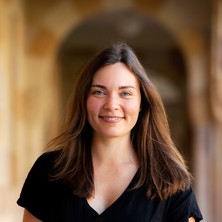
A team from the Sustainable Minerals Institute’s Centre for Social Responsibility in Mining (CSRM) has launched a new teaching and learning resource promoting awareness and understanding of the rapidly changing low-carbon energy transition dynamics across the Arctic.
Led by CSRM Research Fellow Dr Julia Loginova, The Changing Arctic and Just Energy Transitions: Exploring Patterns of Community Consultation and Consent brings focus to the processes of consultation and consent in the region highlighting voices of Arctic Indigenous and non-Indigenous peoples and those working with them.
Dr Loginova says the urgency to accelerate low-carbon energy transitions is pushing the world to seek new lands for access to minerals and technologies that help address climate change.
“The Arctic’s vast and sparsely populated landscape holds abundant natural resources – minerals and wind energy potential, for example. A rapid onset of large-scale industrial activities for resource extraction and wind farm development can be observed across the region,” Dr Loginova said.
“The Arctic has been warming at least four times faster than the rest of the planet. Its Indigenous and non-Indigenous communities are already witnessing an array of environmental, socio-economic, and cultural impacts from climate change.
“The rush to expedite low-carbon energy transitions will likely create new pressures and exacerbate existing vulnerabilities.”
The Changing Arctic and Just Energy Transitions, developed using open-access materials, unpacks the role of the Arctic in global energy transitions and explains patterns of community consultation and consent across the region.
“To achieve one of the project’s key objectives of amplifying the voices of the Arctic communities, the resource brings together diverse perspectives of scholars, industry practitioners, and civil society members living and/or working in the Arctic,” Dr Loginova said.
Community consultation and consent is an internationally recognised mechanism to safeguard the interests and wellbeing of the Arctic Indigenous and non-Indigenous communities affected by mining and other large industrial projects.
“The principle of free, prior and informed consent requires businesses and governments to ensure Indigenous peoples can exercise their right to self-determination and participation in decisions that affect them,” Dr Loginova said.
“Meaningful engagement enables communities to articulate concerns and identify appropriate solutions. As several case studies in this resource demonstrate, communities across the Arctic face numerous challenges to participate in the decision-making processes.
“Due processes of consultation and consent foster justice and fairness in the design and implementation of energy transitions that affect the Arctic people.”
The University of Lapland’s Arctic Centre scholar Dr Tanja Joona underlined the relevance of the resource.
“This is an extremely important platform that provides a versatile picture of energy transition dynamics in the Arctic region”, Dr Tanja Joona said.
The resource will be useful for communities, civil society, educators, and public and private sectors interested in the dynamic shifts underway across the Arctic.
The project was produced by CSRM through the Community-Smart Consultation and Consent Project (CSCC), a five-year initiative supported by the BHP Foundation and implemented by Landesa in partnership with The University of Queensland, RESOLVE and Conservation International.
CSRM Director Professor Deanna Kemp highlighted the value of an open, publicly available resource such as this for its enduring contribution to knowledge building.
“This resource goes a long way in improving our understanding of the social and ecological complexities of the Arctic and the pressures of resource governance facing its peoples”, Professor Kemp said.
“It is critical to achieving the grant’s ambition to support inclusive resource governance and enhance human development outcomes.”
Media: Dr Julia Loginova, +61 7 3346 4070, j.loginova@uq.edu.au; SMI Communications, communications@smi.uq.edu.au.
Banner image: Arctic Indigenous livelihoods based on reindeer herding under threat from energy transitions. Source: Shchipkova Elena / AdobeStock



